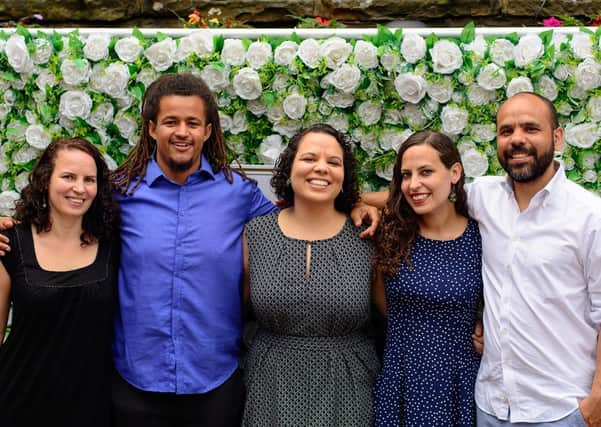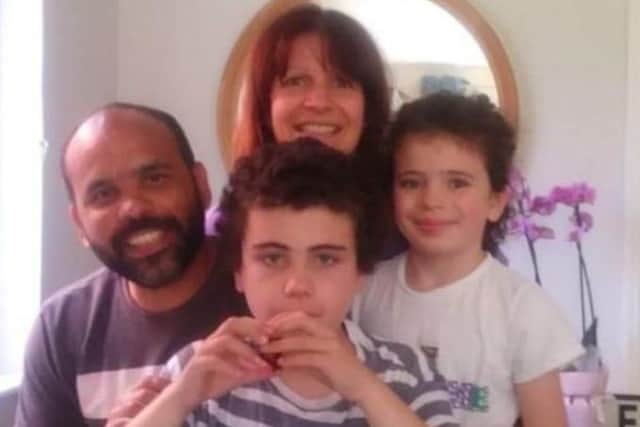I love living in Northern Ireland, but I’ve experienced ugly racism – and not just from white people


Living in Belfast, the horrific death of George Floyd a year ago led me to reflect on my experiences of race and racism.
Knowing that I am privileged in many ways, I had generally avoided seeing myself through the lens of race. However, looking back I now see that I and my friends and family have been affected in varying ways by our appearance and racial identity.
Advertisement
Hide AdAdvertisement
Hide AdMy father is a white American, of English and Irish stock. My mother’s mother was white English and her father black Jamaican. My four siblings and I all have different shades of skin colour.


My brother has quite dark skin and black afro hair, whilst one my sisters has curly light brown hair and hazel eyes. I have brown skin and black hair and am often assumed to be from the Middle East or North Africa.
I mention this because though we have the same ethnic make-up, our complexions have affected how we have experienced the world.
My parents have lived in Bangladesh for almost half a century. I was born in Bangladesh and spent most of the first 12 years of my life there. I met my Northern Irish wife, Donna, in Bangladesh and have now lived in Belfast for 10 years.
Advertisement
Hide AdAdvertisement
Hide AdDuring my time in secondary school in Manchester, where I was one of four non-white students in a school of 1,200, I faced verbal racial abuse on a daily basis – ‘Juggle bunny’, ‘n****r’, ‘black b*****d’, ‘p**i’ etc.
Travelling back and forth from the UK to Bangladesh, almost every time I passed through UK immigration my luggage was searched and I was interrogated.
After one of my first times crossing on the Stranraer-Belfast ferry I was taken aside by police, and – although a UK citizen travelling within the UK – was made to explain where I was from and where I was going before having my photograph and fingerprints taken.
Two years ago whilst driving past Stormont with a car full of friends I was stopped by a police officer for a traffic violation. The officer told me that he would be ‘letting me off’ with a warning, and that this wouldn’t affect my visa or lead to me being deported.
Advertisement
Hide AdAdvertisement
Hide AdI’m not recalling this with any bitterness. However, these repeated experiences build a subconscious sense within me that I don’t fully belong here.
At the same time I am so blessed that on my suburban east Belfast street I have never been made to feel anything but welcome and part of the community, as has been the case in church as a member of Windsor Baptist and now Orangefield Presbyterian.
However, I have friends who have had far worse experiences living in different parts of this city: Nigerian friends whose house was recently graffitied with ‘locals only’, and a Sudanese friend who gets called racist names by youths in his street.
White people don’t have a monopoly on racism. Everyone is racist to some degree or another. I have a friend from Montserrat, in the Caribbean, whose mother was threatening to disown her because she was marrying a Nigerian.
Advertisement
Hide AdAdvertisement
Hide AdA few years ago I was sat in an Indian restaurant in Belfast with a friend when an Indian waiter asked me where I was from. After telling him that I was born in Bangladesh, he bluntly told me hated Bangladesh, and suspiciously spent the rest of our time in the restaurant serving another table. The human heart is wicked and in need of redemption, whatever the colour of the skin.
The topic of race and racism has become highly charge and politicised. Unsurprisingly, some try to give it a wide berth. However, for those of us who believe that our Christian faith should relate to the real world and its problems, this cannot be an option.
Christians must engage, but with a distinctive posture when it comes to these often-volatile conversations: humility, grace and a desire to learn and grow.
As often is the case, the ‘proud and loud’ voices, who claim to have simple solutions, suck up the oxygen in the room, while the majority, who I believe are well-meaning people, are not heard. Many then give up trying to contribute and become apathetic, which is dangerous in itself.
Advertisement
Hide AdAdvertisement
Hide AdWhen it comes to perspectives on the issue of racism there is a vast spectrum. Each end of that spectrum sucks people in and demonises the other; it becomes difficult for people to even talk to each other constructively.
I believe that as Christians we should lend our support to movements which, though not Christian, share objectives aligned with the Bible’s values and teachings, even if we disagree with parts of them. I do not understand how a Christian can deny that ‘black lives matter’ and not show solidarity with attempts to bring about change where black lives appear not to matter as much as other lives. We are never going to find a politician, party, or movement which we can wholly endorse.
If this is the condition for our involvement we must then opt out of engagement with any political processes or positions.
But at the same time, we can also converse about elements of an organisation or movement we do not endorse. As Christians, we can also explain our ultimate hope for justice and peace, and a place where one day every wrong will be righted.
Advertisement
Hide AdAdvertisement
Hide AdChristian leaders have a huge responsibility in this area. If they choose not to engage with these issues, those they lead will seek guidance and form their opinions from elsewhere – quite likely from the multitude of self-proclaimed scholars and prophets on YouTube.
However, though there are awful attitudes and acts of prejudice around us, I believe that I live in one the of best times and places to be an ethnic minority.
The fact that I am able to fearlessly express my opinions on these matters is partly testament to that. Many of my friends and family live in places where they cannot speak so freely.
I feel blessed to live in a part of the world where blatant racism and discrimination are not considered acceptable by the majority of the population or mainstream media or political establishment.
Advertisement
Hide AdAdvertisement
Hide AdMy daughter Tabitha, 10, is one-eighth black and very proud of her diverse heritage. It is sad for me to know that she will find out in the future that not everyone thinks it is so great.
She looks white and will be assumed to be unless she says otherwise. I don’t want her to inherit ‘victimhood’ or ‘guilt’ due her white appearance or her mixed-race heritage.
We may not be able to change the world, but we can be the change we want to see. In the end this is what we will be held accountable for.
• Nathaniel Jennings is the Ireland area representative for the Christian charity OMF International. He lives in east Belfast with his wife and two children